This is one of those stories I think could probably have been written months ago, specifically just after Quibi was first announced. Before we get to the meat and potatoes of this news, let’s go back in time to when ex-chairman of Disney, Jeffrey Katzenberg, announced his new venture: Quibi. The thing about Quibi that was meant to set it apart from the competition was that it was specifically targeted to mobile users. Quibi would offer up a variety of shows, made exclusively for the platform, that would be filmed and edited to support both portrait and landscape orientations. These series (and movies, in fact) could be consumed in bite-sized chunks rather than the usual uninterrupted length of time it takes to watch, well anything.
It was all designed for a mobile watching experience and didn’t even support an option to throw an image up onto a screen. From the outset, people were sceptical of the idea. The limited functionality, the already saturated and highly-competitive market for quickly consumable online videos and services requiring a rather steep subscription cost of $5 a month (or $8 if you want no ads. Blegh) meant that despite the $1.75 billion raised by Katzenberg and co-founder and CEO Meg Whitman, no-one really saw a future in Quibi. Turns out, we were all right as just six months after the launch, Quibi is officially dead.

Quibi, I hardly knew ye
Quibi confirmed that it was shutting its doors in a blog post released after The Wall Street Journal wrote a report stating that might be the case. In the blog post, Katzenberg and Whitman write, “Quibi was a big idea and there was no one who wanted to make a success of it more than we did. Our failure was not for lack of trying; we’ve considered and exhausted every option available to us.”
Honestly, after reading through the statement, it almost feels like Quibi is patting itself on the back a little too much for what many rightfully assumed to be a terrible idea. “We opened the door to the most creative and imaginative minds in Hollywood to innovate from script to screen and the result was content that exceeded our expectations. We challenged engineers to build a mobile platform that enabled a new form of storytelling — and they delivered a groundbreaking and delightful service.”
Katzenberg and Whitman offer up some possible suggestions as to why Quibi failed so dramatically (it’s the shortest-lived streaming service ever at this point, lasting only six months). The reasons include, “the idea itself (not being) strong enough to justify a standalone streaming service or because of our timing.”
Which are probably both accurate. An entire streaming service dedicated to short-form video was definitely not a strong idea and launching into a pandemic-stricken world where people don’t have the money to throw at such an unnecessary service was not such a great move either. Maybe if the service was free but still included ads, sure. Requiring users to pay for what is essentially high-budget TikTok? Yeah, no-one wants that.
Thus, Quibi closes its doors without really leaving much of a mark on the world at all. “We have reluctantly come to the difficult decision to wind down the business, return cash to our shareholders, and say goodbye to our colleagues with grace. We want you to know we did not give up on this idea without a fight,” reads the blog post.
It’s an unfortunate case for all those employees who don’t have hundreds of millions of dollars to their names and it’s those people that I really feel for. Yet Quibi, as a project and product, seemed doomed to fail from the start. That’s what happens when a company thinks they understand how the internet works but really doesn’t get beyond the most basic forms of social media.
(Source: The Verge)